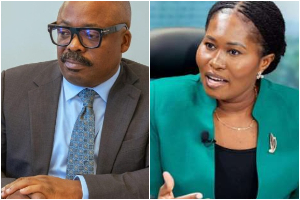I have always asked a very simple question in my journalism class any time I meet fresh students: “Which field of journalism will you find yourself if you decide to practice?” Unsurprisingly, the majority of the students want to be in the arts and entertainment fraternity.
For them, the opportunity to be easily recognized, and the ease with which stories in that field are very much “easy” to relate and write. Of course, comparing it to either economic or political reporting, which according to them requires “so much effort.” That’s their thinking; that’s the mentality they have about arts and the entertainment: a field that’s very much part of all of us. Arts is us; we are arts!That’s why a cursory scan of blogs in Ghana will present a striking majority of arts and entertainment related blogs, and thus an equal number of bloggers.
That’s also why issues in the industry affects almost everybody: human interest. But sadly, that’s why arts is treated purely for its human-interest value, without much commitment. That’s where the arts writer has been accused of not doing much to help shape the industry, as others have done in other jurisdictions that see the value of arts, and respect the agents that make that sector what it is. The value of Arts and the Government Commitment
The creative arts industry is too broad an industry to be taken for granted. It is the back bone of every economy. The United Nations Conference on Trade and Development (UNCTAD) classifies creative industries into four broad groups: heritage, arts, media and functional creations. And these include Traditional cultural expressions, Cultural sites, Visual arts, Publishing and printing, Design, Performing arts, Audiovisual, New media and Creative services–architectural, advertising, creative R&D, cultural and recreational. Freelance film journalist, Alexa Dalby in a contribution to an article on the viability of the creative industry in Africa, asserted that “Part of Africa’s projected 5.2% GDP growth rate in 2013 was attributed just to the popularity of Nollywood. It’s the country’s second-or third-largest employer and the third-largest film industry by value in the world after Hollywood and Bollywood, generating an estimated $500-$800m annually. It creates over 1million jobs in a Nigerian population of 168.8m; at 6%, this is almost the same percentage as the industry does in the US.”
And what has contributed to this feat that Nigeria is chalking? Prudent structures from the government. Alexa continued: “The Nigerian government made a $500m loan facility available for the entertainment industries under the Nigerian Creative and Entertainment Industry Stimulation Loan Scheme (NCEILS), released by the African Development Bank (AfDB). Of this overall fund, $200m is allocated to the film industry, and is packaged and distributed by the Bank of Industry and Nexim Bank.”
Ghana has all the Ministries, Departments and Agencies that are arts and tourism related. So also are there fair legislation that can help the industry flourish. Prior to the assumption of power by the New Patriotic Party administration, I asserted that the test of their willingness to promoting Tourism, Culture and the Creative Arts is to give that Ministry a Cabinet status. The call was a result of the excuse that the sector ministry was always under resource, and the ministers assigned to the sector were more often than not too “light weight” to pull strings.
Good news “we” have a cabinet portfolio. What next then? Performance! And who ensures that what is due the sector is fulfilled?
The Role of the Arts Writer Are there arts writers in the country? This call is often made when arts writers are treated with disdain. Yes. There are more than many arts writers in Ghana? Their impact? Well it lends itself to discussion. The segmentation in the field readily calls for coordination.
That there is no vibrant arts writers’ association in the country is most worrying. I gather there have been several attempts by arts writers to establish a formidable union that can help shape the sector, from the perspective of writers, but……..
A Google search of Arts Writers Association of Ghana (ATWAG) recalls the following headlines written by arts writers from 2008 when the idea of the Associated was mooted and “formed:” 2008: Arts Writers Revive Association – ModernGhana.com 2009: Arts Writers Association Hangs–Peacefmonline.com 2016: ATWAG Rejuvenated – YFMGhana.com, Entertainmentgh.com
Even in its rejuvenation, there appears there is a re-rejuvenation in 2017, as an interim Executive had to be formed on emergency basis to re-rejuvenate an Association that’s struggling to stand. But there is hope for the new ATWAG. The Association now has a Constitution that will guide its operation.
ATWAG’s mandate is to promote the interest and the welfare of its members; promote cooperation and collaboration among members; collaborate with national media associations and related organizations in promoting professional and ethical standards, safeguarding and promoting the rights and privileges of arts and tourism writers in Ghana.
The Association also seeks to promote greater understanding of media issues through research, seminars, and conferences. All said and done, our fate is in our hands as arts writers. “Unionization” is the way to go. SWAG has picked up so well, that I know.
There’s no reason there shouldn’t be a vibrant Association for arts writers and journalists. We have the capacity to influence policy. We stand to challenge ourselves through continuous training in order to be world class. These can’t be done in our individual capacities. Thus, ATWAG is a step towards our “redemption.” Without a vibrant arts writers’ association, we have no business being on the necks on MUSIGHA, GHAMRO, Actors’ Guild, FIPAG, ASORG: Associations arts writers have berated over the years. ATWAG exists. And your favourite arts and entertainment writer or journalist is a member.
Entertainment of Monday, 7 August 2017
Source: Flex Newspaper
Feature: Can anything good come from arts writers in Ghana?
 William Asiedu
William Asiedu












